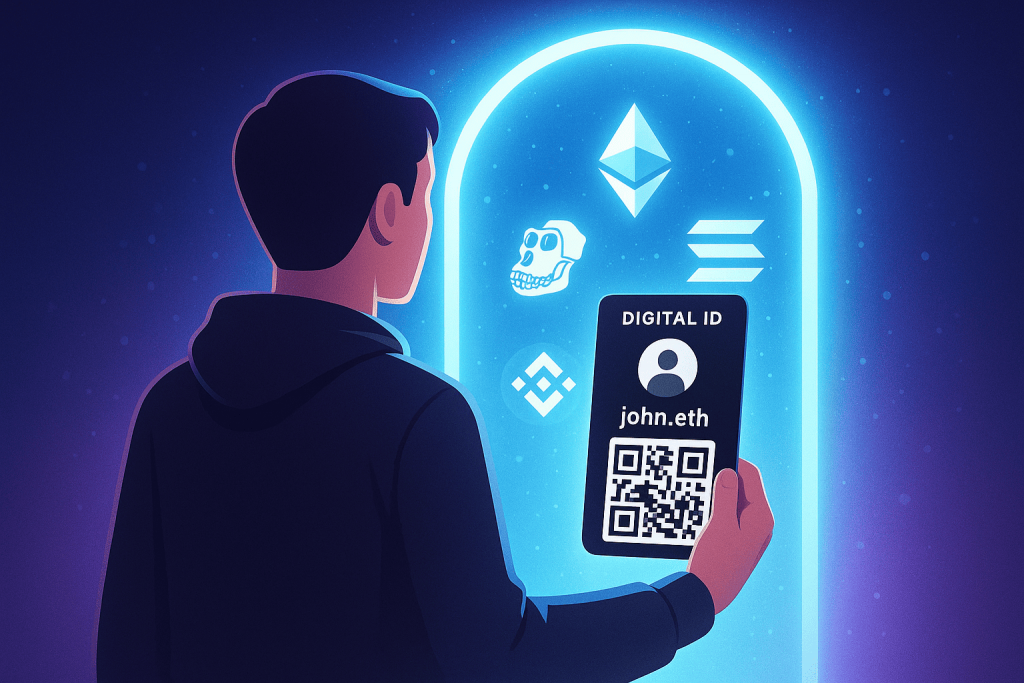
The internet is evolving rapidly. What we know as Web2 — with traditional websites, hosting, and domain names — is gradually transforming into Web3: a decentralized digital reality where users own their data, identity, and digital assets. One of the most striking developments in this transformation is the rise of NFT domains — unique names that function both as web addresses and cryptographic assets.
In this article, we’ll explore what NFT domain real estate is, how it differs from classic domains, how futuristic domain zones work, and whether it’s worth investing in them today.
What Is an NFT Domain?
An NFT domain is a domain name recorded as a non-fungible token (NFT) on a blockchain. It is a digital asset that:
- belongs directly to the user (no intermediaries or registrars);
- is stored in a crypto wallet;
- can serve as a Web3 identity;
- functions as an address for cryptocurrency payments or decentralized websites.
For example, a domain like name.wallet or nft.crypto can be linked to a user on the Ethereum or Polygon blockchain and used to receive crypto payments or interact with Web3 services.
Popular Futuristic Domain Zones
Unlike classic domains like .com, .ua, or .org, NFT domains use alternative extensions outside the traditional DNS (ICANN) system. Popular ones include:
- .crypto, .wallet, .nft, .blockchain — by Unstoppable Domains;
- .eth — by Ethereum Name Service (ENS);
- .bit — used by Namecoin;
- .zil — based on the Zilliqa blockchain;
- .bnb — within the Binance Smart Chain.
These zones are not yet supported by standard browsers, but can be accessed through browser extensions or Web3-friendly browsers like Brave.
How NFT Domains Differ from Traditional Domains
| Parameter | Traditional Domain (.com, .ua) | NFT Domain (.crypto, .eth) |
| Management | Via registrar | Via blockchain / crypto wallet |
| Registration | Requires yearly renewal | Often purchased once, permanently |
| Infrastructure | DNS, WHOIS, ICANN | Decentralized blockchain storage |
| Use Cases | Websites, email | Payments, NFT wallets, Web3 identifiers |
| Security | Depends on the provider | Cryptographic protection |
Why NFT Domains Are Called Digital Real Estate
- Limited supply — Just like land, short and catchy domain names are quickly taken.
- Resale potential — NFT domains can be resold on marketplaces like OpenSea or Rarible.
- Full ownership — You own the domain outright, with no renewal fees or risk of cancellation.
- Web3 integration — NFT domains are part of your digital identity, linking to tokens, wallets, social profiles, or decentralized sites.
Use Cases for NFT Domains
- Decentralized websites — Host a site on IPFS or Arweave and link it to an NFT domain.
- Crypto payment address — No need to memorize long wallet addresses — just send to ivan.nft.
- Personal or business brand in the metaverse — A unique Web3 name for identity, branding, or community interaction.
- Investment — Just like .com domains in the 90s, early NFT domain names may gain value over time.
Risks and Limitations
- No global browser support — Access is limited to Web3-compatible browsers and tools.
- Poor search engine indexing — NFT domains are not indexed like traditional websites.
- Legal uncertainty — NFT domains are not governed by ICANN, so legal protection is limited.
- No recovery options — Losing your private key means losing the domain forever.
Will NFT Domains Replace Traditional Domains?
Currently, NFT domain zones can’t fully replace traditional domains like those offered at rx-name. They’re not yet suitable for SEO, corporate email, or full SSL certificate integration without extra steps. However, NFT domains represent a new layer of digital culture, primarily serving Web3, DeFi, crypto communities, and metaverse applications.
In practice, it makes sense to combine both: use traditional domain names for your main website, and NFT domains for crypto wallets, Web3 identity, or side projects.
Conclusion
NFT domains aren’t just hype — they’re a step toward a new way of interacting with the internet, where users own and control their digital space. These domains have the potential to reshape digital identity and domain ownership. However, they still face technical, legal, and usability barriers before becoming mainstream.
For businesses, e-commerce, and reliable online infrastructure, domain name registration from a trusted provider remains the best choice. At the same time, NFT domains are a promising addition — a window into the Web3 future of your brand.

Leave a Reply